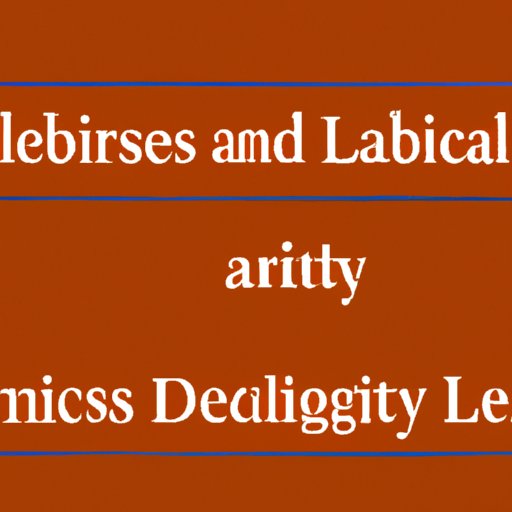Introduction
Liberal arts and sciences is an interdisciplinary field of study that encompasses a broad range of disciplines including language and literature, history, sociology, mathematics, natural sciences, and more. It is often seen as a complement to professional or technical fields, as it provides students with a well-rounded education and prepares them for a variety of career paths. This article will explore the definition, benefits, impact, and value of a liberal arts and sciences degree.

Role of Liberal Arts and Sciences in Education
At its core, liberal arts and sciences is an approach to learning that focuses on developing critical thinking skills and a broad understanding of the world. It encourages students to think outside the box and explore different perspectives. According to the Association of American Colleges and Universities, “the purpose of a liberal education is to give students a breadth and depth of knowledge that will enable them to thrive in a rapidly changing global society.”
To understand the core principles of liberal arts and sciences, one must look at the history of the field. It originated in ancient Greece and Rome, where it was considered essential for citizenship. Over the centuries, it has evolved to include a variety of disciplines and approaches to learning. Today, it is widely used in higher education as a way to prepare students for a wide range of career paths.
When examining the benefits of a liberal arts and sciences education, it is important to note that it provides students with a comprehensive understanding of the world. Students are exposed to a variety of topics and ideas that help them develop strong problem-solving and communication skills. These skills can be applied to any field, from business to medicine, and can lead to professional success.

Impact of Liberal Arts and Sciences on Society
The relationship between liberal arts and sciences and social change is complex. On one hand, it can be argued that the liberal arts and sciences provide students with the knowledge and skills they need to become informed citizens and advocates for social change. On the other hand, some argue that the liberal arts and sciences can also serve to reinforce existing power structures and norms, which can limit progress.
Regardless of which perspective one takes, it is clear that the liberal arts and sciences have the potential to play a significant role in shaping society. Studies have found that graduates of liberal arts and sciences programs are more likely to engage in civic activities and volunteerism, and are more likely to hold leadership positions in their communities. This suggests that the liberal arts and sciences have a positive influence on society.
In addition to its role in social change, the liberal arts and sciences can also be used to enhance lives. Liberal arts and sciences courses provide students with an opportunity to explore new ideas and challenge their preconceived notions about the world. The knowledge and skills gained through these courses can be used to enrich personal and professional lives.

Value of a Liberal Arts and Sciences Degree
When comparing liberal arts and sciences degrees to other degrees, it is important to consider the job market. While there are certain professions that require specific degrees, such as engineering or medicine, many employers are now looking for candidates who have a well-rounded education. A liberal arts and sciences degree can provide students with the skills and knowledge they need to stand out in a competitive job market.
In addition to providing students with a competitive edge in the job market, a liberal arts and sciences degree can also lead to professional success. Studies have found that those with a liberal arts and sciences degree earn higher salaries than those without one. This suggests that a liberal arts and sciences degree can lead to greater career prospects.
Interplay Between Liberal Arts and Sciences and Professional Careers
Investigating the ways in which liberal arts and sciences can prepare students for professional careers is essential to understanding the value of a liberal arts and sciences degree. Liberal arts and sciences courses equip students with the skills necessary to succeed in any field, from communication and problem-solving to research and analysis. In addition, liberal arts and sciences courses can help students develop the soft skills needed to navigate the professional world, such as networking and self-promotion.
Liberal arts and sciences can also help professionals advance in their careers. Studies have shown that those with a liberal arts and sciences background are more likely to be promoted and receive higher salaries than those without one. This suggests that a liberal arts and sciences degree can be a valuable asset for those looking to advance their careers.
Conclusion
Liberal arts and sciences is an interdisciplinary field of study that encompasses a wide range of disciplines. It is often seen as a complement to professional or technical fields, as it provides students with a well-rounded education and prepares them for a variety of career paths. This article has explored the definition, benefits, impact, and value of a liberal arts and sciences degree, examining the role it plays in education, society, and professional careers. It has also demonstrated how a liberal arts and sciences degree can lead to professional success.
(Note: Is this article not meeting your expectations? Do you have knowledge or insights to share? Unlock new opportunities and expand your reach by joining our authors team. Click Registration to join us and share your expertise with our readers.)
